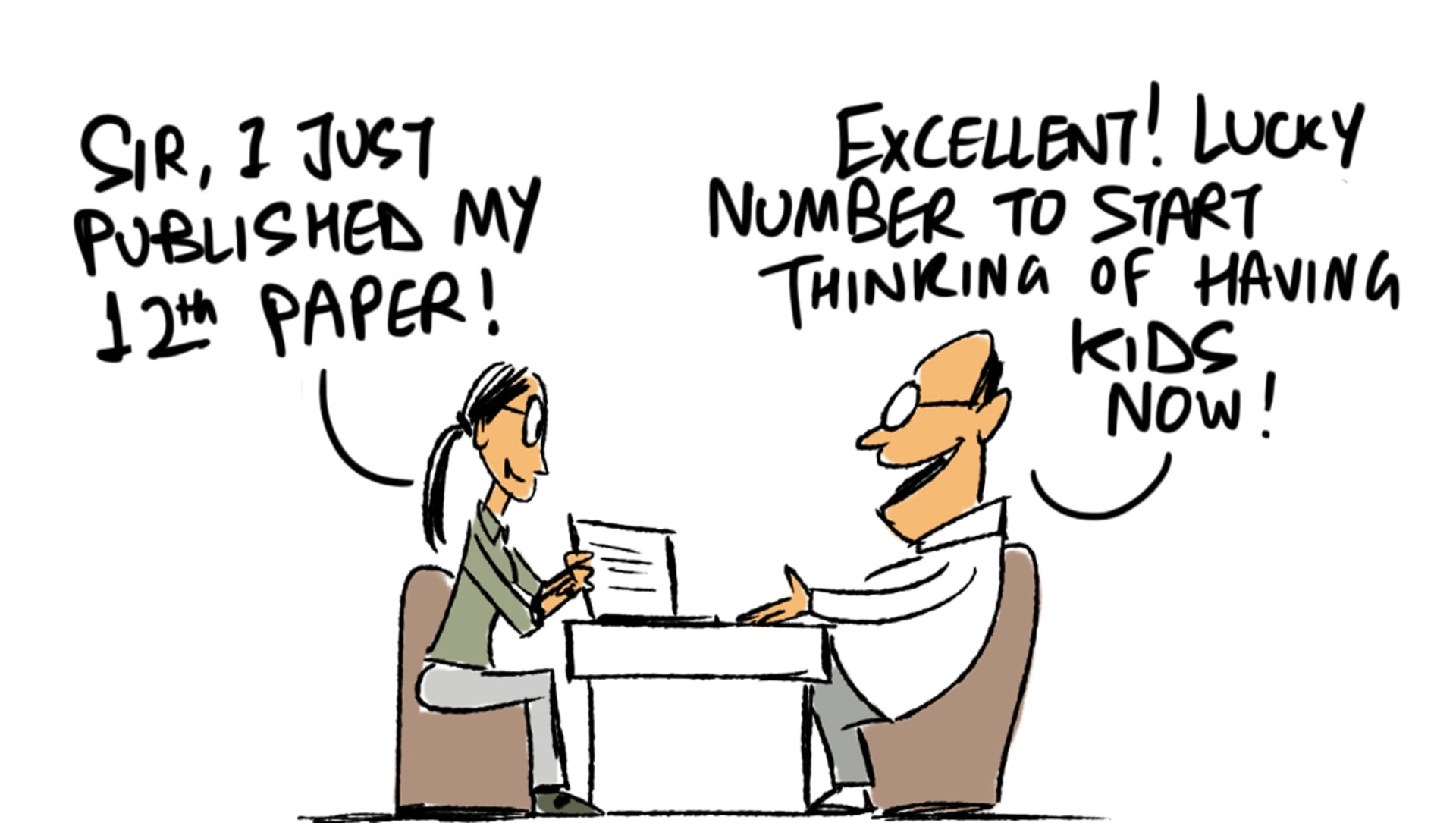Gender bias and effects
The halo effect (sometimes called the halo error) is the tendency for positive impressions of a person, company, brand or product in one area to positively influence one’s opinion or feelings in other areas. Halo effect is “the name given to the phenomenon whereby evaluators tend to be influenced by their previous judgments of performance or personality.” The halo effect which is a cognitive bias can possibly prevent someone from accepting a person, a product or a brand based on the idea of an unfounded belief on what is good or bad (Wikipedia)
The Matilda effect is a bias against acknowledging the achievements of those women scientists whose work is attributed to their male colleagues. This effect was first described by suffragist and abolitionist Matilda Joslyn Gage (1826–98) in her essay, “Woman as Inventor” (first published as a tract in 1870 and in the North American Review in 1883). The term “Matilda effect” was coined in 1993 by science historian Margaret W. Rossiter (Wikipedia)
The Matthew effect of accumulated advantage, Matthew principle, or Matthew effect for short, is sometimes summarized by the adage “the rich get richer and the poor get poorer“. The concept is applicable to matters of fame or status, but may also be applied literally to cumulative advantage of economic capital. In the beginning, Matthew effects were primarily focused on the inequality in the way scientists were recognized for their work. However, Norman Storer, of Columbia University, led a new wave of research. He believed he discovered that the inequality that existed in the social sciences also existed in other institutions. (Wikipedia)
Academic housework is a notion corresponding to unskilled and therefore undervalued tasks usually assigned to young recruits or women
A boys’ club is a private informal network of largely or exclusively male members, whose socially homogeneous members are chosen by co-option to help each other in the professional field by using their influence. Other synonyms are old boys’ club, good old boys’ clubs, old boys‘ network (Wikipedia).
The leaky pipeline is a metaphor for the way that women disappear from some geeky careers (especially STEM) and hobbies.

“Queen bee” is a derogatory term applied to women who have achieved success in traditionally male-dominated fields. These women often take on “masculine” traits and distance themselves from other women in the workplace in order to succeed. They may also view or treat subordinates more critically if they are female, and refuse to help other women rise up the ranks as a form of self-preservation.
Stereotype threat is a situational predicament in which people are or feel themselves to be at risk of conforming to stereotypes about their social group. It is purportedly a contributing factor to long-standing racial and gender gaps in academic performance. Since its introduction into the academic literature, stereotype threat has become one of the most widely studied topics in the field of social psychology.
The term greedy work describes a job that disproportionately rewards someone who works longer hours, for example, by accepting overtime, and over a longer period of time.
Glass ceiling…
Glass ceiling is a metaphor used to represent an invisible barrier that prevents a given demographic (typically applied to women) from rising beyond a certain level in a hierarchyd invisible barriers that militate against women’s access to top decision-making and managerial positions in an organisation, whether public or private and in whatever domain.

The Glass Ceiling Index (GCI) is a relative index comparing, by level, the proportion of women with the proportion of women in senior positions.
The Male Advantage Index (MAI) is defined as the ratio between the proportion of male A-ranked researchers/researchers and the proportion of female A-ranked researchers/researchers.
Sticky floor complements the concept of a glass ceiling. Sticky floors can be described as the pattern that women are, compared to men, less likely to start to climb the job ladder. Thereby, this phenomenon is related to gender differentials at the bottom of the wage distribution. Building on the seminal study by Booth and co-authors in European Economic Review, during the last decade economists have attempted to identify sticky floors in the labour market. They found empirical evidence for the existence of sticky floors in countries such as Australia, Belgium, Italy, Thailand and the United States.
Glass cliff is the phenomenon of women in leadership roles, such as executives in the corporate world and female political election candidates, being likelier than men to achieve leadership roles during periods of crisis or downturn, when the risk of failure is highest.
Harassment
Harassment covers a wide range of behaviors of an offensive nature. It is commonly understood as behavior that demeans, humiliates or embarrasses a person, and it is characteristically identified by its unlikelihood in terms of social and moral reasonableness. In the legal sense, these are behaviors that appear to be disturbing, upsetting or threatening. They evolve from discriminatory grounds, and have an effect of nullifying a person’s rights or impairing a person from benefiting from their rights. When these behaviors become repetitive, it is defined as bullying. The continuity or repetitiveness and the aspect of distressing, alarming or threatening may distinguish it from insult.
Discriminatory harassment includes any action suffered by a person with the purpose or effect of violating his or her dignity or creating an intimidating, hostile, degrading, humiliating or offensive environment. (Law n°2008-496 of 27 May 2008)(Loi n°2008-496 du 27 mai 2008)
Sexual harassment is the repeated imposition on a person of comments or behaviour with sexual or sexist connotations which either violate their dignity because of their degrading or humiliating nature, or create an intimidating, hostile or offensive situation for them.
The relationship of authority is no longer necessary to characterise harassment. The same applies if the conduct takes place outside working hours or the workplace. A similar definition can be found in the Criminal Code and the Labour Code (art. L1153-1 of the Labour Code and art. 222-33 of the Criminal Code)
Behaviours assimilated with sexual harassment is second type of harassment resulting from serious pressure exerted “with the aim (…) of obtaining an act of a sexual nature, whether this is sought for the benefit of the perpetrator or for a third party”. This assimilated sexual harassment is easier to characterise than the first type because it is constituted when the following elements are present
- Serious pressure (in other words, sexual blackmail to grant certain things to the victim in exchange for sexual relations);
- Even if not repeated;
- With a real or apparent purpose (only the expressed intention of the perpetrator counts. It can then be the result of a game or be expressed to really obtain a sexual favour);
- For the benefit of the perpetrator or a third party.
Ambient Sexual Harassment is defined as the general or ambient level of sexual harassment in a work group as measured by the frequency of sexually harassing. Sexual harassment can consist of environmental or atmospheric harassment, where, without being directly targeted, the victim is subjected to provocations and obscene and vulgar jokes that become unbearable.
The bystander effect is a social psychological phenomenon in which individuals are less likely to offer help to a victim when others are present. The higher the number of spectators, the less likely it is that is that any one of them will be able to help.
Man… something
Mansplaining (a blend word of man and the informal form splaining of the gerund explaining) is a pejorative term meaning “(of a man) to comment on or explain something to a woman in a condescending, overconfident, and often inaccurate or oversimplified manner”. Author Rebecca Solnit ascribed the phenomenon to a combination of “overconfidence and cluelessness”. Lily Rothman, of The Atlantic, defined it as “explaining without regard to the fact that the explainee knows more than the explainer, often done by a man to a woman”.

In its original use, mansplaining differed from other forms of condescension in that it was said to be rooted in the assumption that a man is likely to be more knowledgeable than a woman. However, it has come to be used more broadly, often applied when a man takes a condescending tone in an explanation to anyone, regardless of the age or gender of the intended recipients: a “man ‘splaining” can be delivered to any audience. In 2010, it was named by the New York Times as one of its “Words of the Year”. American Dialect Society nominated Mansplaining as the “most creative” new word in 2012.
Manterrupting is a term that was coined in early 2015 by Jessica Bennett in an article[1] that appeared in Time. Bennett defines the term as “[u]nnecessary interruption of a woman by a man.” During the 2016 American presidential debates, the term was applied to candidate Donald Trump, who interrupted Hillary Clinton dozens of times during the first and second debates.
[1]How not to be ‘manterrupted’ in meetings
Manderstanding when jokes or banter is exchanged in sociazl settings that only men will undestand and agree with, leaving all the women confused and left out.
Manslamming when a man is oblivious to make way for a woman coming from the opposite direction, slamming into her if she doesn’t move.
Manspreading when a man sits with his legs wide apart that it encroatches space and hagbagging when a woman (or hag) takes up extra space on public transport with her bags (shopping or otherwise) in a feeble attempt to assert their dominance over space otherwise occupied by men.

Bropropriating when a man taking credit for a woman’s idea.
Sexism
Actions or attitudes that discriminate against people based solely on their gender.
Sexism is an ideology based on the assumption that women are inferior to men, on the one hand, and on the other hand, a series of manifestations ranging from the seemingly insignificant (remarks) to the most serious (rape, murder). These manifestations are intended to delegitimise, stigmatise, humiliate or violate women and have effects on them (self-esteem, psychological and physical health and changes in behaviour). (HCE – Janvier 2019)
It is a sexist comptent, except in the cases provided for in Articles 222-13, 222-32, 222-33 and 222-33-2-2, to impose on a person any comment or behaviour with a sexual or sexist connotation which either violates his or her dignity because of its degrading or humiliating nature, or creates an intimidating, hostile or offensive situation against him or her (Article 621-1 of the French Penal Code).
Going further …
- VIDEO. “Manterrupting” : quand les hommes ne peuvent s’empêcher d’interrompre les femmes
- Mansplaining, manspreading, bropropriating! – what do these accusations against men mean and are they fair?
- “Manspreading”, “male gaze”… petit glossaire des inégalités hommes-femmes du quotidien
- WOMEN AT WORK : Speaking While Female
- L’effet Matilda : femmes, science et discrimination
- VIDEO “Crétin de cerveau ! #1 — L’effet de Halo“